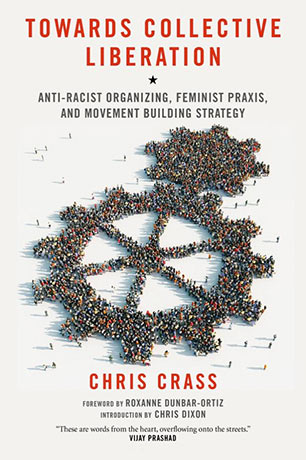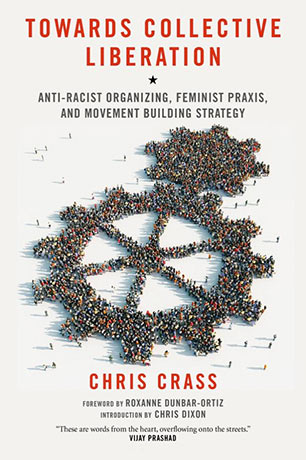 (Image: PM Press)As a white Southern man, military veteran and organizer, I remain deeply aware of the race and gender inequalities that structure American society, my own local community and our actions worldwide. This awareness comes from my own active participation in and subsequent reflection on such systems. My East Tennessee upbringing rooted me in these concepts of oppression and hate; my parents and friends taught me white supremacy, homophobia and gender inequality from an early age.
(Image: PM Press)As a white Southern man, military veteran and organizer, I remain deeply aware of the race and gender inequalities that structure American society, my own local community and our actions worldwide. This awareness comes from my own active participation in and subsequent reflection on such systems. My East Tennessee upbringing rooted me in these concepts of oppression and hate; my parents and friends taught me white supremacy, homophobia and gender inequality from an early age.
My military experience exposed me to new people and ideas. Nonetheless, racism fundamentally structured my 2004 military deployment to Iraq, where American soldiers regularly used terms like “Haji” when referring to Iraqi citizens. I joined Iraq Veterans Against the War (IVAW) in 2007, seeking a movement that challenges oppression and militaristic American values. Our work often presents a daunting task, and I, like many organizers, struggle to find the mentorship, skills and vision needed for success.
I struggle with questions of leadership, organizational development, strategy and privilege. What is my role in creating change? How can I support the leadership of historically marginalized people? How can we create powerful, dynamic movements to achieve our goals? How do we counter the divide-and-conquer strategy of the power elite? Where can a new organizer find the right guidance? Where can experienced organizers look for encouragement, inspiration and growth?
Author Chris Crass recently has written an honest, humble and inspiring book on social movement building titled Toward Collective Liberation: Anti-Racist Organizing, Feminist Praxis, and Movement Building Strategy available for $20 from PM Press. I recommend this book to change-makers and organizations at any stage of development, especially to those working in majority-white or male-dominated communities.
This collection of Crass’ essays and interviews with other highly skilled organizers provides deep insights, showing how anti-racist, feminist practice helps our movements win by transforming the systems that divide us and undermine our collective success. Crass’ writings push me to examine my own life – my upbringing, military experience and subsequent activism – seeking lessons that illuminate a vision for the world we need as well as the pathway to realize that vision.
Crass’ title recalls feminist author bell hooks’ concept of collective liberation – the idea that systems of oppression cut across lines of difference like race, class, gender and sexuality – thus my own freedom from oppression remains deeply connected with yours despite any difference. For Crass, “[i]f systems of liberation are connected, then we must help white people, men, and middle- and upper-class people create and win these systems and go through a transformative process of change while working for systemic change.”
Toward Collective Liberation calls on white people to “develop anti-racist consciousness that unites them with communities of color working for justice.” Crass states his broader purpose early on: “The primary goal of Toward Collective Liberation is to help our movements further develop the visions, strategies, cultures, organizations, practices, and relationships we need to build and win a democratic and socialist society.”
Crass addresses the question of how we build a liberated society by acknowledging that we constantly reproduce systems of oppression in our own movement work. Crass’ worldview prioritizes openness, honesty, vulnerability, action and reflection. He focuses on how we learn both individually and collectively, stating:
One of the key lessons throughout this book is that we do not simply come up with answers to the questions before us and apply them. Our answers are continually evolving through a process of studying, developing ideas, putting them into practice, reflecting on our practice, getting feedback on our practice, drawing lessons, and further developing our beliefs and strategies accordingly. […] But to build broad support for anti-racism in white communities and feminism among men, it is also necessary to move large numbers of white people and men into active participation in a multiracial, feminist movement for democracy and socialism; intervening on oppression, then, is necessary, but not enough.
Crass’ essays and interviews build momentum by mirroring a developmental path similar to what any activist or organization might experience. The reader not only gets a sense of what it’s like to move from being a new activist to an experienced organizer but also what it’s like to move from being a young, chaotic organization to a more mature, highly functional and visionary one.
Crass spends substantial time discussing his own personal development throughout the 1990s as well as the organizational development of San Francisco Food Not Bombs (SF FNB). Within that narrative, he discusses FNB’s larger role helping build the anarchist Left, showing how FNB functions as an important gateway for activists. He highlights years of important organizing work, drawing out many lessons concerning organizational structure and leadership development.
Crass also demonstrates the overt and subtle ways that white heterosexual male privilege negatively impacts social justice work and provides detailed descriptions of how SF FNB took measures to check privilege, create accountability, and build a more inclusive, democratic organizational structure.
Toward Collective Liberation shifts gears in later chapters by highlighting advanced, visionary organizing work – organizations and individuals working across the country to build collective liberation values, vision and strategy among progressive left circles and white communities.
Cutting-edge groups like the Catalyst Project and the Heads Up Collective illustrate how collective liberation values can strengthen the anti-war movement and help end American militarism.
Oregon’s Rural Organizing Project uncovers how white, working-class, rural communities can build solidarity with queer communities, people of color and immigrant farm-workers. An interview with Carla Wallace of the Fairness Campaign in Louisville, Kentucky, reveals how multiracial alliances with the LGBTQ community can shift power in the Southeastern United States.
Organizers from the Groundwork Collective underscore lessons learned during the Wisconsin Uprisings and the Occupy movement, showing how change-makers can seize opportunities “in a way that builds for a broader vision of racial, economic, and social justice.”
Why should you read a book on this topic by a middle-class white guy? You could instead read any number of books on this topic written by people from marginalized communities. What does Crass uniquely provide that hasn’t been said before, and why is this perspective valuable? (I credit my partner Rushelle Frazier and fellow IVAW leader Joyce Wagner for pushing me on this question. Our discussions on Toward Collective Liberation highlighted this particular question’s importance while also providing insights and answers.)
First, readers should absolutely study the works of marginalized communities; their perspectives remain indispensable guideposts along the path that ends patriarchal white supremacy. But Crass’ writing targets specific audiences: white males, those working in majority-white or male-dominated communities and folks looking to understand how privilege specifically impacts movement building.
White people in our movements too often dismiss issues of race and privilege, particularly when confronted by people of color. Heterosexual men regularly dismiss issues of gender and sexuality, particularly when confronted by women or the LGBTQ community. Many of us tend to ignore the existence and complexities of our own privilege, and we easily ignore the problems and experiences of people who do not resemble us.
But Crass argues that white men can play an important role by speaking to other white men, helping them understand their own privilege and learn what it looks like to take action that challenges systemic oppression. Crass repeats this important lesson throughout the book: People of color cannot end white supremacy; only white people can choose to do that. Likewise, women cannot end patriarchy; only men can choose to do that.
Crass demonstrates how white people and men can successfully fulfill this important role, and the book’s usefulness comes from its ability to guide and catalyze movement building toward a liberated society. Toward Collective Liberation gives me fresh ideas for engaging my own local community and the larger military community where I organize. The book leaves me with a strong sense of hope, pondering questions and possibilities for the future.
How can East Tennessee become a diverse, multiracial, empowering community based on compassion and love? How can I support women, people of color and gender-queer folks already taking the lead locally in East Tennessee? How can IVAW (or any organization) model the society we want, creating space for diverse leadership? What if military communities model this same diversity instead of reproducing white hetero-normativity? More largely, what would it look like when our country eradicates structural racism within our prison systems, our military ranks and foreign policy abroad? Wouldn’t our world change substantially for the better? Could mass incarceration and modern American warfare even exist?
Speaking against the authoritarian crackdown
In the midst of a nationwide attack on civil liberties, Truthout urgently needs your help.
Journalism is a critical tool in the fight against Trump and his extremist agenda. The right wing knows this — that’s why they’ve taken over many legacy media publications.
But we won’t let truth be replaced by propaganda. As the Trump administration works to silence dissent, please support nonprofit independent journalism. Truthout is almost entirely funded by individual giving, so a one-time or monthly donation goes a long way. Click below to sustain our work.
